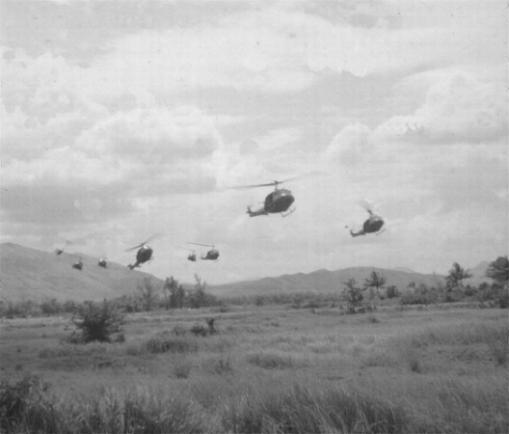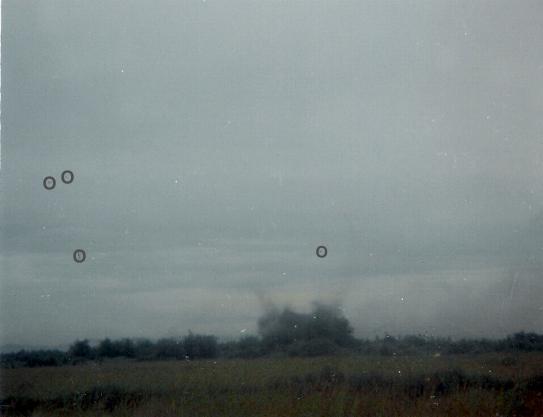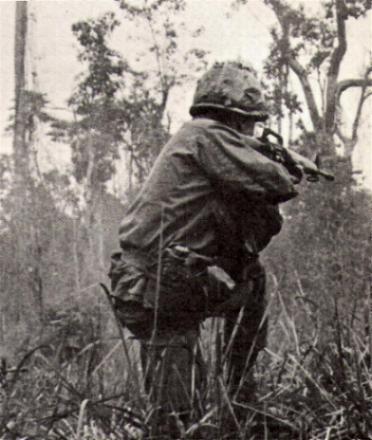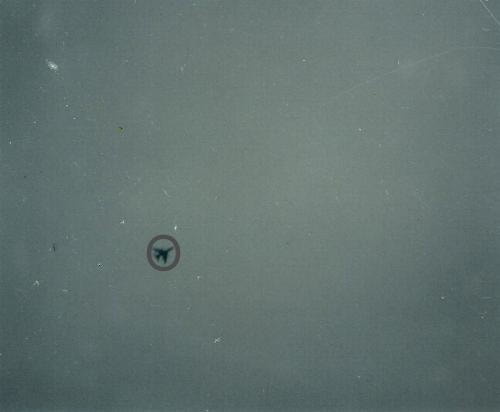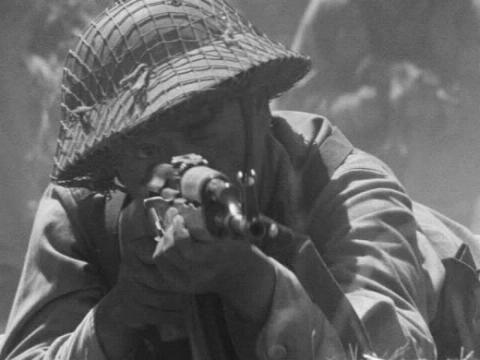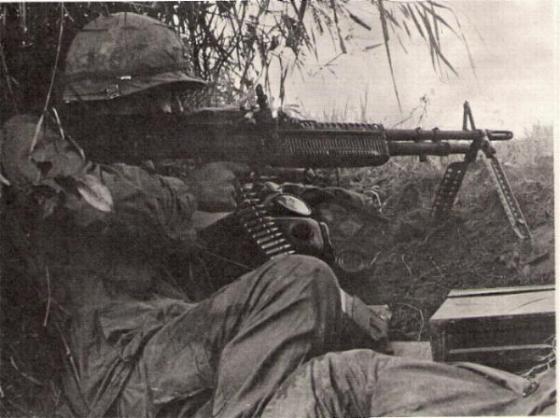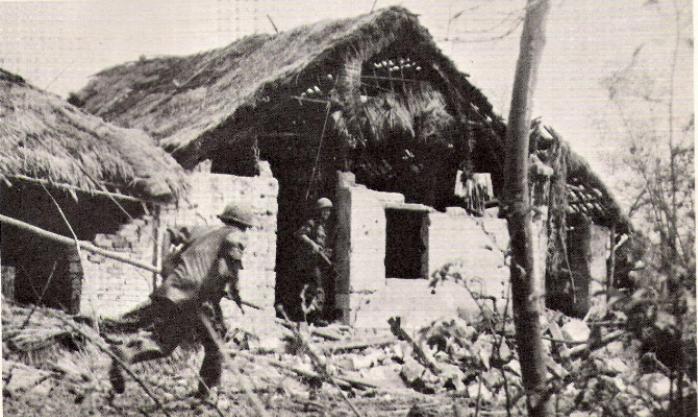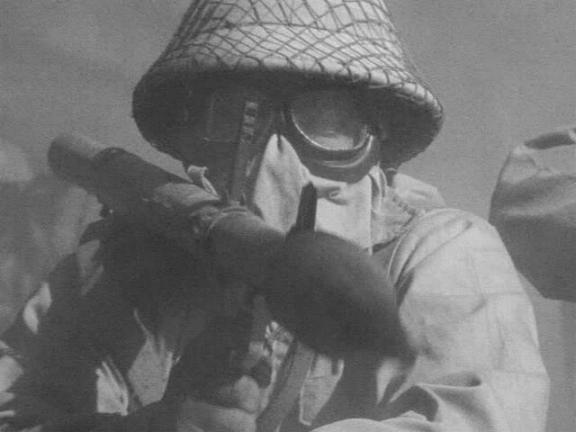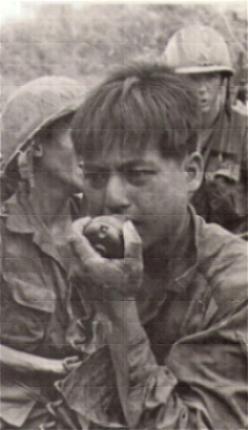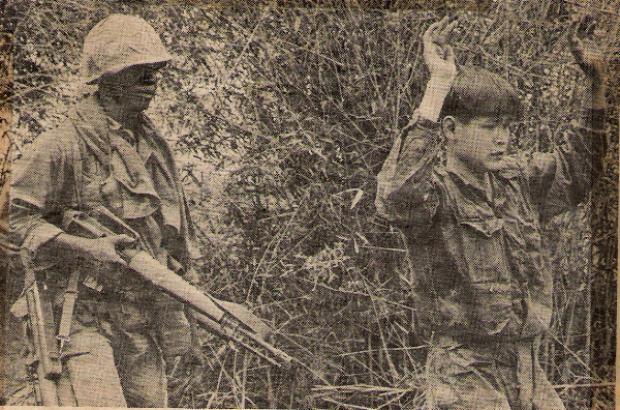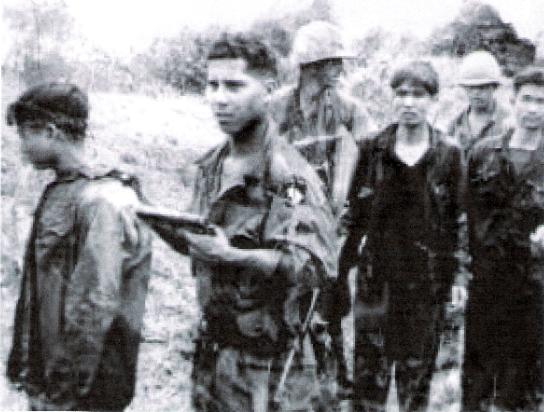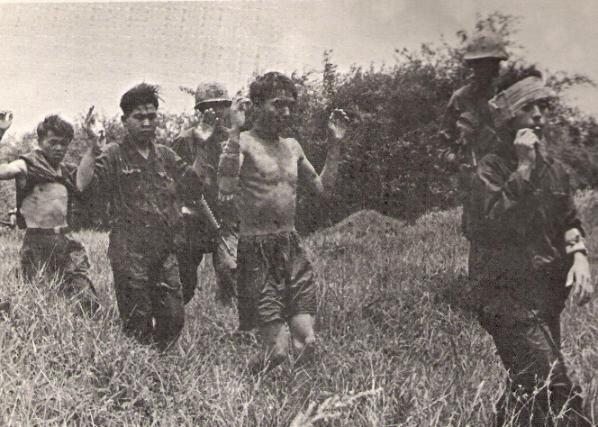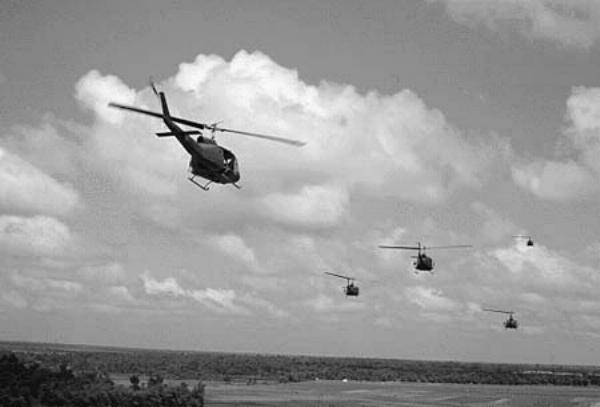The Classic Cordon Operation of the Vietnam War Phouc Yen
I am Charles "Country" Cole. I was a SP/4 and riflemen with 1st Platoon, A Co. 1/502nd Airborne Infantry, 2nd Brigade, 101st Airborne Division. A Co. was deployed to Vietnam in December 1967. I was sent to A Co. in February 1968 with twenty four other replacements. It didn't even bring the company back up to full strength.
They had been in some fierce fighting and lost a good many men. I spent my first night in the I Corp area at Phu Bai in a tent. The battle for Hue was going on a few miles away. We had a rocket attack that night and there were no bunkers to get in and no one had told me to dig a foxhole, so I watched out the tent and saw the rockets blowing up a couple hundred yards away. I thought it was kinda scary, but exciting.
The next morning, we were taken to the airfield and we walked by all these shot up and messed up helicopters and planes on our way to the helicopter that was taking us to LZ Jane where the 2nd Brigade was based. We flew to LZ Jane and they landed outside the wire and let us off. LZ Jane looked like mud city with tents and barbed wire. We went into the camp and made our way to A Co.'s area of tents and mud.
We met a tough First Sergeant who told us to get what we needed out of this pile of bloody and muddy gear that probably belonged to some of the men we were replacing. They gave us some new bolts for our M-16s because the old ones didn't work that well. We were then put on a deuce and a half and sent to join our company. A Co. was a few miles away at a bridge with an ARVN compound beside it. The company was here for a night of rest. I got to spend my first night in the field at the compound with a roof over my head and no guard duty, because the ARVN's were guarding us.
My first meeting with First Platoon was kinda shocking to me as these were some of the roughest looking soldiers I had ever encountered. I had never seen any in the movies or anywhere that compared with these guys. I found out they were the best and if I had to fight again, I hope it could be with them. I also found out the 101st Airborne Division is a very aggressive and hard fighting outfit.
They sent us out to look for the enemy day and night. We didn't go back to some basecamp every night as I have read some of the other outfits in Vietnam got to do. We were out running patrols, sweeps, search and destroy, combat air assaults, and ambushes for up to thirty days without coming in to basecamp during these first six or seven months of 1968.
A bath and clean clothes were things you just didn't think about anymore. You wore your clothes until they started to rot off of you and then they would send you some more. If we got a little down time beside a river, we made good use of it and got clean for a little while. Life in the field in a war can be rough, but the next four days I am going to tell you about were four of the roughest.
A Co. had been moved to An Lo Bridge on April 28th, 1968. I assume we were being held in reserve until we were needed for a mission. We didn't have to wait long. We had been there a few hours when we were alerted late in the evening for a combat air assault . We didn't know at the time where we were going, but it was a village two miles northwest of Hue called Phouc Yen.
They had been in some fierce fighting and lost a good many men. I spent my first night in the I Corp area at Phu Bai in a tent. The battle for Hue was going on a few miles away. We had a rocket attack that night and there were no bunkers to get in and no one had told me to dig a foxhole, so I watched out the tent and saw the rockets blowing up a couple hundred yards away. I thought it was kinda scary, but exciting.
The next morning, we were taken to the airfield and we walked by all these shot up and messed up helicopters and planes on our way to the helicopter that was taking us to LZ Jane where the 2nd Brigade was based. We flew to LZ Jane and they landed outside the wire and let us off. LZ Jane looked like mud city with tents and barbed wire. We went into the camp and made our way to A Co.'s area of tents and mud.
We met a tough First Sergeant who told us to get what we needed out of this pile of bloody and muddy gear that probably belonged to some of the men we were replacing. They gave us some new bolts for our M-16s because the old ones didn't work that well. We were then put on a deuce and a half and sent to join our company. A Co. was a few miles away at a bridge with an ARVN compound beside it. The company was here for a night of rest. I got to spend my first night in the field at the compound with a roof over my head and no guard duty, because the ARVN's were guarding us.
My first meeting with First Platoon was kinda shocking to me as these were some of the roughest looking soldiers I had ever encountered. I had never seen any in the movies or anywhere that compared with these guys. I found out they were the best and if I had to fight again, I hope it could be with them. I also found out the 101st Airborne Division is a very aggressive and hard fighting outfit.
They sent us out to look for the enemy day and night. We didn't go back to some basecamp every night as I have read some of the other outfits in Vietnam got to do. We were out running patrols, sweeps, search and destroy, combat air assaults, and ambushes for up to thirty days without coming in to basecamp during these first six or seven months of 1968.
A bath and clean clothes were things you just didn't think about anymore. You wore your clothes until they started to rot off of you and then they would send you some more. If we got a little down time beside a river, we made good use of it and got clean for a little while. Life in the field in a war can be rough, but the next four days I am going to tell you about were four of the roughest.
A Co. had been moved to An Lo Bridge on April 28th, 1968. I assume we were being held in reserve until we were needed for a mission. We didn't have to wait long. We had been there a few hours when we were alerted late in the evening for a combat air assault . We didn't know at the time where we were going, but it was a village two miles northwest of Hue called Phouc Yen.
First Platoon came in the first load. It was a hot LZ and our pilot wouldn't get lower than six or eight feet off the ground. He told us if we were getting off, we had better go, because he was leaving. We jumped out into the paddy under fire and started moving toward the enemy. It was pretty open ground where we were with not much cover.
We were moving pretty fast in our assault toward the village and a line of trees. Captain Speigleberg was yelling he had to have that line of trees. We took the line of trees, which were only forty to hundred yards from the enemy positions and the village. We could hear the enemy talking, ringing this eerie bell, and yelling obscenities at us.
It was dark by this time. This line of trees extended down to the Song Bo River, probably three hundred yards to the left from where we assaulted them and out into the field where they just ended. We were put into two man positions behind this line of trees for the night. Our supporting artillery started firing flares off and on during the night to help us see the enemy in case they tried a counterattack. We had attacked the 8th Battalion 90th NVA Regiment. There were 600 enemy in this village. We didn't know this at the time.
We were spread thin behind this line of trees with maybe a hundred thirty men in A Co. If they had hit us hard with a well planned attack in these first few hours, they may have overrun our thin line and escaped this trap we had them in. They were surrounded on three sides by the Song Bo River in this stocking shaped village . We were covering the only land route out of the village with the Black Panthers on our right flank. A Co. 1/501, B co. 2/501, and 3 PF platoons had moved in across the river around the other sides of the village and were covering them from crossing the river and escaping.
I do not know to this day why 1st platoon was split up during this battle, but we were. I was in 2nd squad and we were positioned on the far right of our line nearest the enemy village. First and third squad of 1st platoon were sent down toward the river to secure the positions down there. Second and third platoons were between us. There was not much sleep to be had this first night as the enemy was in talking distance from us.
From all the equipment I saw during our assaults on the village abandoned in the enemy foxholes nearest to our positions, I believe they moved out of here when we assaulted the tree line. These positions were only about forty yards from our nearest positions to the village. The enemy positions around a hundred yards from us were occupied for the next three days. We had two hours on guard and two hours sleep in this order for most of the three nights we spent here. As near as I can remember, the enemy tried a breakout attempt early the next morning, but were unsuccessful.
We were spread thin behind this line of trees with maybe a hundred thirty men in A Co. If they had hit us hard with a well planned attack in these first few hours, they may have overrun our thin line and escaped this trap we had them in. They were surrounded on three sides by the Song Bo River in this stocking shaped village . We were covering the only land route out of the village with the Black Panthers on our right flank. A Co. 1/501, B co. 2/501, and 3 PF platoons had moved in across the river around the other sides of the village and were covering them from crossing the river and escaping.
I do not know to this day why 1st platoon was split up during this battle, but we were. I was in 2nd squad and we were positioned on the far right of our line nearest the enemy village. First and third squad of 1st platoon were sent down toward the river to secure the positions down there. Second and third platoons were between us. There was not much sleep to be had this first night as the enemy was in talking distance from us.
From all the equipment I saw during our assaults on the village abandoned in the enemy foxholes nearest to our positions, I believe they moved out of here when we assaulted the tree line. These positions were only about forty yards from our nearest positions to the village. The enemy positions around a hundred yards from us were occupied for the next three days. We had two hours on guard and two hours sleep in this order for most of the three nights we spent here. As near as I can remember, the enemy tried a breakout attempt early the next morning, but were unsuccessful.
There were over 14,000 rounds of artillery fired into this village and 14 airstrikes on it by jets, helicopter gunships, and prop planes. It was quite a show. My memory fails me on the exact time we assaulted the village, but I believe it was later in the day on the 29th of April. We moved into the village with three points until contact was made.
We then took out some of the enemy positions with some of 1st squad earning Silver Stars doing it. One man from 1st squad, a new guy was missing after this assault. His body was later found on May 1st. We were withdrawn from the village after this fight and more artillery and airstrikes were brought in.
We sniped at each other off and on from these front line positions. At night the artillery would stop, but they would keep the flares going off and on to keep the enemy from sneaking out the village or overrunning us in the dark. On the 30th of April, a lot of the same things were going on. The Black Panthers assaulted the village from their positions and had to withdraw after running into heavy resistance. We assaulted the village again in the same area we had been on the first assault.
We went in on three points again and ran into heavy resistance after going about seventy-five to hundred yards into the village.
One of our men on the point for second squad was killed by a RPG and our machine gunner was wounded. I had to take over as assistant machine gunner for Joe who took over as machine gunner. We were moved to the front of the assault and plenty of ammunition was given to us. Joe was firing cover for someone to get our fallen comrade's body back. He couldn't place effective fire on the enemy lying on the ground, so he stood up and fired from the hip until the barrel on the M-60 was burnt up. I had to stand up with him to feed the machine gun. Our friend's body was recovered and we withdrew from the village to our line of trees.
The third night was different. They started flying a helicopter around with a PA system blaring out an eagle caw at them and then telling them in Vietnamese that they were brave and courageous soldiers, but their position was hopeless. They also broadcasted it in American so we could understand. They tried to get them to give up and save their lives, but it was not to be yet.
In the early morning hours of May 1st, A Co. 1/502 was hit with a sixty round mortar attack with another breakout attempt. I believe 30 or 40 of the enemy were killed outright in this attack. We lost the Platoon Leader and Platoon Sergeant of second platoon in this breakout attempt. Some of the guys from 2nd, & 3rd platoons, and 1st & 2nd squads of 1st platoon could tell you more about this action, as I was on the far right side, and the enemy was firing at us from their positions in the village, but did not come out and try to come through us as they did more on the left side of our line.
The machine gunner was called down to the left side of the line to help with the wounded and left me alone with the machine gun. I could pick out fire coming from three positions in front of me and when they would slack up, I would pop up and spray them and duck back down. If I killed any of them, I don't know, but I sent plenty of lead in their direction.
Helicopters were landing thirty to forty yards behind our line in sight of the enemy taking out our wounded and dead. We had some brave pilots and crews over there that would try to do anything to help us. My hat is off to them and they have my greatest respect. There was also a heavy gun crew that was brought in and put right on the line with us. I don't know what unit they came from, but they did a great job. The enemy did not break out in this attempt and we all settled back in to lick our wounds.
One of our guys from 2nd squad was hit in the back later in the day. He had a hole the size of a baseball in his back. He walked to the helicopter with some of us helping him. He later wrote us and told us it had barely missed his heart, but he had survived. My squad leader had already been wounded twice, but would not leave the battlefield. Later this day, they pulled us back from our positions about a 1/4 mile and brought in the jets with some heavy stuff. It is really something to watch these guys work out from this distance. I will never forget it. We had to duck the casings from some of their fire. You could hear the enemy shooting at them as they pulled out of their attack run and headed for safety. In his last run he dropped a bomb so big it shook the ground we were standing on. After this, a few old prop planes came in and did their thing.
We were moving back into our positions behind the tree line when we heard a B-40 rocket or a RPG being fired from the enemy position in front of ours that we hoped had been knocked out. I was second in the line of march back to our positions out near where the trees ended in the field. I looked around and saw the rocket hit maybe twenty yards behind the rest of second squad. Five of second squad went down from this one rocket. One man was killed and the rest had to be evacuated. My squad leader had been hit the third time and it was bad enough he had to be evacuated this time. There were now only three of us left out of second squad from the eleven we had when this battle started. I was the only one out of these that hadn't been wounded. They brought the helicopter back out and started broadcasting to the enemy again.
Finally a NVA sergeant came out and gave up. He was allowed to go back in and bring some more enemy soldiers out. We were sent in to mop up the diehards.
This is when I noticed all the enemy equipment that had been left in some of their positions. I was on right flank as we were sweeping down the enemy positions. We hadn't run into anything so far. We came to a place where the bushes jutted out into the field a little. There was an enemy bunker in this area. They sent me to check it out. I walked up on it from the front and saw it was connected by a trench to the next one. I had started around the side of it, when I heard three shots that sounded like they went off three feet from my head. I felt a burning in my left arm and I hit the ground and crawled out of there a lot faster than I came in. I got back to where the rest of the squad was and told them the bunker was occupied. They approached it from the back and threw a grenade in it.
I was sent back to where they were bringing in the prisoners and evacuating the wounded. My wound was not real bad, but it went halfway through my arm at the elbow joint. I picked myself up an NVA belt with the red star on it on the way back.
In the end, 107 NVA had surrendered to us. Four hundred nineteen NVA had been killed. A Company lost 8 or 9 KIA and 33 WIA. It was the largest en masse surrender of the NVA to an American unit of the Vietnam war.
Colonel John H. Cushman was commanding the 2nd Brigade during this period. MG O. M. Barsanti was commanding the 101st Airborne Division at this time. A Co. 1/502 was attached to the 501st Battalion during this battle. The 21st Artillery was our fire support. Air Force fighter-bombers also joined this battle.
Colonel John H. Cushman was commanding the 2nd Brigade during this period. MG O. M. Barsanti was commanding the 101st Airborne Division at this time. A Co. 1/502 was attached to the 501st Battalion during this battle. The 21st Artillery was our fire support. Air Force fighter-bombers also joined this battle.
A Co. was airlifted back to LZ Sally late in the evening of May 1st. What was left of the company was given ice cream that night. I missed it as I had to go with the medivac to Da Nang to get my arm looked after. By the time I got back a day or two later, the company had been sent to another battle, which is a story one of them will have to tell. I was kept out the field for ten days from my wound.
Phouc Yen will forever be imprinted in the minds of the soldiers who where there and each one of them could tell his story. I was proud to have served with A Company, 1st Battalion 502nd Airborne Infantry and will never forget these fine men, the ones still here and the ones that didn't come back.
AIRBORNE!!! Charles "Country" Cole
1st Plt. A-1/502nd Airborne Infantry
68-69
Phouc Yen will forever be imprinted in the minds of the soldiers who where there and each one of them could tell his story. I was proud to have served with A Company, 1st Battalion 502nd Airborne Infantry and will never forget these fine men, the ones still here and the ones that didn't come back.
AIRBORNE!!! Charles "Country" Cole
1st Plt. A-1/502nd Airborne Infantry
68-69

